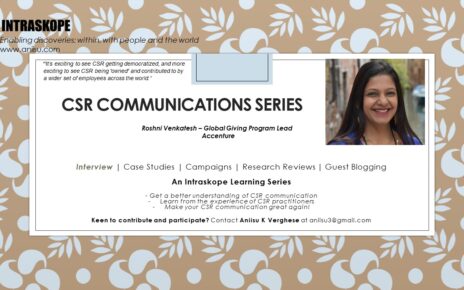What does the new normal mean for Corporate Social Responsibility and sustainability champions? What trends and conditions must practitioners be aware of? How can we be future-ready?
COVID-19 has upended all that we imagined about giving, volunteering, stakeholder engagement and more.
Take for example these trends from recent research findings:
- 71% will never trust brands that put profits over people (Edelman COVID-19 Trust Barometer 2020)
- Among 130 Indian companies, the total CSR spend by eligible listed companies in fiscal 2019, nearly 80% of the total CSR funds were spent. (Crisil Yearbook 2020)
- Of the 17 SDGs the most impacted due to COVID-19 were: poverty, well-being and hunger (MDPI, 2020)
- Academics/scientists were the most trusted during the pandemic and CEOs emerged as the least trusted (Edelman Trust Update, 2020 Spring)
- 75% of businesses did not have a governance structure or a definite policy to address any ethical lapses or fraud in CSR programs. (EY Forensic & Integrity Services’ report, 2020).
The above facts tell us that a lot has changed in the mindset of people as well as how organizations and communities are perceiving social responsibility and sustainability efforts based on actions taken. More importantly, the pandemic has exposed corporate behavior and put the spotlight on unethical approaches, which stakeholders watched with dismay.
Consumers have said they will resist brands who have profited from the crisis and many have indicated their actions were directed at punishing such offenders including boycotting products and services offering by these organizations. There is increasing interest in environmental, social and governance (ESG) principles with investors focusing on growing their portfolios linked to this space.
All this poses risks and opportunities for organizations and practitioners. Despite organizations being concerned about how much longer they can manage through uncertainty or with limited resources and external threats like cybersecurity concerns, there are positive attempts to balance stakeholder needs and leadership commitment to be pragmatic about the situation. Surprisingly, the fears are also within with organizations ill-equipped to manage social commitment resources without due diligence process and policies in place. The exposure to fraud during this time and after is heightened. Although there are efforts by organizations to pivot and be values-led in dealing with the crisis (making much needed hand sanitizers, PPE kits and masks etc), a majority of stakeholders are demanding recovery initiatives be directed at solving the most pressing social and environmental issues that cropped up. Likewise, digital volunteering is seeing an uptick with more people indicating interest to contribute in ways that matter.
Trends indicate a shift to reimagining how giving is managed – from increased partnerships to more localized interventions; from social innovation to unique ways to measure impact – there are opportunities ahead for practitioners. To be future ready, practitioners need to focus on being values-led in all interventions, seek avenues to partner and collaborate (with resources, talent, time and effort), be empathetic in engagements, invest in ESG since more organizations will seek such professionals, take personal accountability in actions and do the right thing for the communities.
Overall, the role of practitioners will shift to be more purpose-driven, local and impact-led. Understanding key trends and their impact on how we approach social responsibility and sustainability efforts can create newer opportunities for practitioners and equip us to deal with changes in the future.
Aniisu K Verghese serves as a resource person in his personal capacity for the Online Certificate Programme on Optimizing Corporate Social Responsibility for Greater Good conducted by IIHMR University and India CSR.


